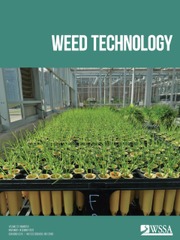-
- You have access: full
- Open access
- ISSN: 0890-037X (Print), 1550-2740 (Online)
- Editor: Jason K. Norsworthy University of Arkansas, Fayetteville, AR, USA
- Editorial board
The journal focuses on:
- Applied aspects concerning the management of weeds in agricultural systems
- Herbicides used to manage undesired vegetation, weed biology and control
- Weed/crop management systems
- Reports of new weed problems
-New technologies for weed management and special articles emphasizing technology transfer to improve weed control
-Articles dealing with plant growth regulators and management of undesired plant growth may also be accepted, provided there is clear relevance to weed science technology, e.g., turfgrass or woody plant management along rights-of-way, vegetation management in forest, aquatic, or other non-crop situations.
-Surveys, education, and extension topics related to weeds will also be considered
Recently published articles
The average time from article submission to first decision is 45.6 days
Featured article from latest issue
Read the related blog

-
Weed Zapping – Do electrocution treatments have a place in weed control?
- 01 August 2022,
- Researchers from the University of Missouri recently conducted two field studies to explore the effectiveness of electricity in weed control. They used a tractor...
Weed Science Society of America Blog

-
Climate Change to Drive High-impact, Range-shifting Invasive Plants into the Mid-Atlantic and Northeastern U.S.
- 09 February 2024,
- Climate change could shift where invasive plant species establish hotspots, and certain U.S. states could be negatively impacted without a rapid response plan....

-
Single Major Gene Controlling S-Metolachlor Resistance Identified in a Central Illinois Waterhemp Population
- 17 January 2024,
- Recently published research in the journal Weed Science provides new mechanistic insights into S-metolachlor resistance in waterhemp.

-
Distinguishing invaders from native plants
- 27 July 2023,
- Researchers have developed a tool that can distinguish specimens of common reed reliably in the field, without time-consuming and costly genetic testing.




Tweets by worldofweeds